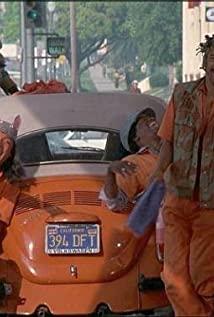saw it almost halfway through, I was convinced that the character who claimed to be an "accountant" was the real one. The identity is-the god of death. It also clarified the context of the entire movie. After confirming the identity of the "accountant", the panoramic view of the movie is officially revealed.
1. The accountant can always find Milton through the smell.
2. The accountant's goal is also to hope that Milton will die.
3. The accountant cannot be killed by ordinary means (the first time in a car chase With a normal gun, only the glass was broken. It did not cause any harm to him). And as long as you write down someone’s name, that person will die (in the driving conversation, she will die as long as you write Piper’s name in the notebook)
4. Through the "accountant" and the so-called "Satan" in the "church" "Admirer" dialogue: "Why have I never heard Satan mention you?" And from the curly-haired man, he drew a purple thread representing doctrine and compared it with the purple thread of the "accountant" in the details. The texture of the tie is the same. And with a contemptuous tone, he held the string and compared it with his tie, which was too sloppy, it was a joke. This concludes that the "accountant" has a direct connection with death and Satan.
5. And he was curious why everyone wanted Miller to die? Then he helped Milton in the opposite direction.
6. After killing the "accountant", there will be no heaven and hell anymore (As mentioned in the conversation about holding Piper.) After holding Piper in the final battle, still let Milton do what he wants to do, regardless of whether he succeeds or not. He will win. And through Milton’s oral confirmation, his "accountant" is the god of death.
As a result, the accountant's identity was confirmed and then returned to the affirmation of Milton's identity.
1. Being chased by the god of death, wanting to die
2. Weber said that Milton had been dead for a long time, and even carried the coffin himself.
3. Milton's ID card has expired for a long time.
4. Everyone thinks that he is dead.
5. Weber said that Milton used to be a thug, but a good father. And Milton told himself before the bonfire what happened to his relatives but couldn't do anything. And Milton stated that he had been in jail.
6. When King Joan was finally killed, Milton said: "I am not the person here."
(The above points can be concluded: Milton is either dying, or escaped from hell after he died. Evil spirit. Milton’s recovery function is obviously not an ordinary person, so it is concluded that Milton is the latter.) After
confirming the positioning of the main character, the outline of the movie is clear: Milton in hell watched his daughter join the cult, and then was killed. His niece is about to be used for sacrifice. Then he wanted to escape to the world and save his only living relatives. The god of death knew that Satan didn’t like this way of offering children to sacrifice to show his loyalty (mentioned in the final dialogue between the god of death and the drinking Milton), so he borrowed Milton to walk in and get the special gun (Milton was in During the conversation with the Grim Reaper who held Piper, Grim Reaper asked Milton how he got the gun, and told the gunman that I just let him in and got the gun, let him do what he wanted, and slow me down.) . Go and kill King Qiao'an who is satanic. And the invisible film line of the death god also unfolded one by one, using Milton to get rid of disobedient disciples for his master, and let Milton accomplish what he wanted to do. But he slowed down and chased Milton's soul back. As a win-win situation, he and Milton returned to where they should be.
The overall plot is relatively simple and old-fashioned. But revealing the answer through the embedded layers can also see that the director’s detailed arrangement is very smooth and reasonable. Although it is generally not common to watch movies with violent or bloody genres, they do not think that this movie is just a combination of violence and blood, as many people commented. In the play, the arrangement of the details, the promotion of the spiritual theme, and the affirmation of the power of family affection. It is also responding to the final finishing touch: "Hell also has compassion." Just because of the "slowness" of "bad guys", it also gives "hell's sympathy" the power of God-like salvation-in a single thought, This place is also hell and heaven. Perhaps what the movie really wants to say is-don't underestimate the power that any bit of "goodness" can bring!
View more about Drive Angry reviews











